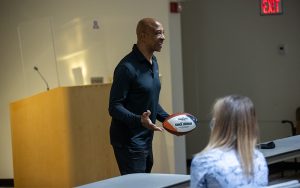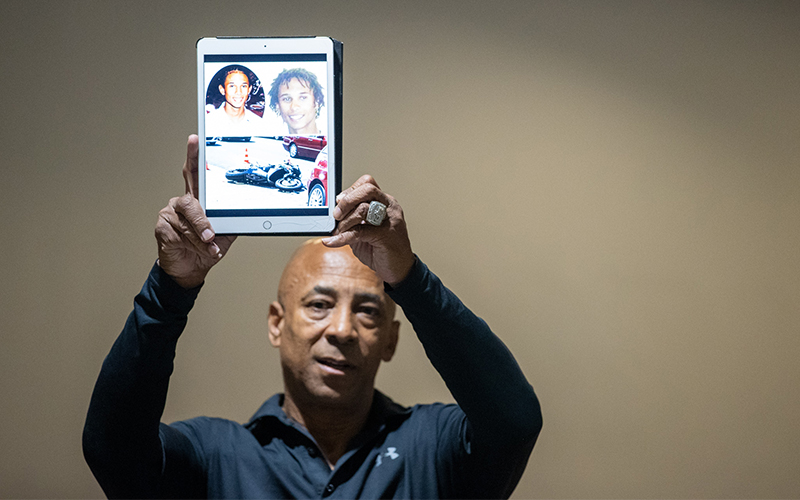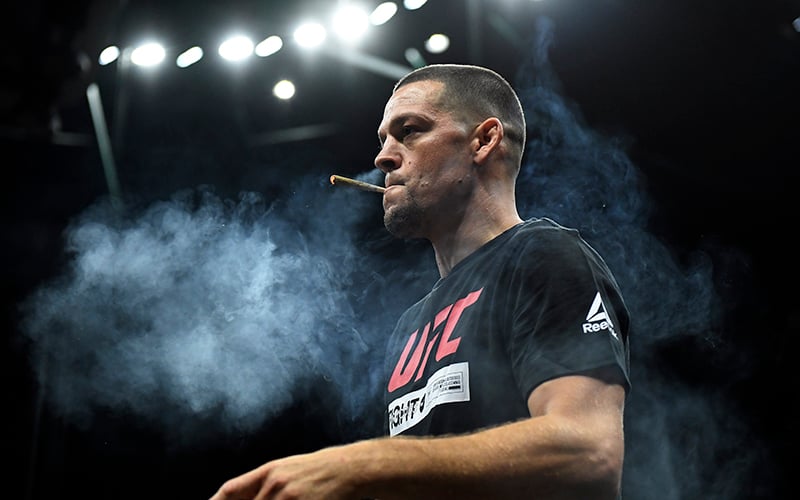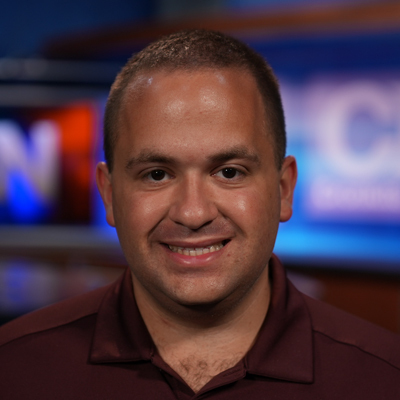TUCSON – Vance Johnson stood in his front yard, a boulder in his hands, and looked down at his father, Geno, laying on the ground, drunk.
Looking back up at Vance, his father said, ‘Just f—— kill me, I’m a piece of crap anyway.”
Vance Johnson, who had dragged him out there, threw the boulder beside his father’s head and replied, “If you ever touch my mother again, I will freaking kill you.”
That moment provides just a glimpse into Vance’s formative years. Now 58, the former University of Arizona football star and NFL wide receiver shared the story of his fall into substance abuse during and after his playing days in his recent presentation, “Transparency is Transformation: A Journey Into and Out of Addiction,” at the University of Arizona Cancer Center.
The University of Arizona Health Sciences Comprehensive Pain and Addiction Center hosted the free presentation that featured Johnson’s testimony about his problems with addiction and domestic issues while growing up. He said he “made a promise to God” that when he achieved sobriety he would come back to “the very place that it all started” and share his story.
And so he did.

Vance Johnson said he first started playing football as a kid to avoid the abusive environment at home. (Photo by James Franks/Cronkite News)
Johnson recalled that his father was raised by the streets of New Jersey and that it put a strain on his father’s relationship with his family. When the Johnsons moved to Tucson, Geno got involved with gang activity there, and Vance Johnson said he had to watch his father’s domestic abuse “every day.” He remembers running away whenever there was a birthday celebration in his home because he knew that party guests wouldn’t know what was really happening there behind closed doors.
And Johnson admits that he grew to hate his father.
“I have to be real honest and transparent, I planned on killing my dad when I got a certain age where I knew I was bigger and stronger than him,” he said.
A prep All-American in football and track at Tucson’s Cholla High School, Johnson said his success in athletics helped him better cope with the traumatic life he was experiencing at home.
“As I continued to do good in sports, I started to feel good because people would be clapping for me and they were so excited when I won,” he said. During his high school days he didn’t drink or do drugs because he said he wanted to avoid being like his father.
From the flood of offers coming in from all over the country, he chose to attend the University of Arizona for one reason – to remain close to home, where he could protect his mother.
He quickly emerged as a two-sport star for the Wildcats, earning All-Pac-10 honors as a running back in 1982 and winning an NCAA championship in the long jump that same year. He narrowly missed making the 1984 U.S. Olympic team in the long jump, falling about 2 inches short at the U.S. Olympic Trials.

Johnson says he is “responsible” for the death of his son, who was hit by a drunk driver after Johnson was unable to give him a ride home. (Photo by James Franks/Cronkite News)
But while his athletic career was blossoming, so was his dark side.
He began drinking and popping pills in college and said he didn’t realize he was falling into addiction because of how much the substances helped him cope. He admits he drove drunk to football games and was pulled over by the police on multiple occasions. The only reason he was let go without a charge was because the officers noticed who he was, a star athlete.
But the addictions worsened. And he became very much like the person he had wanted to avoid being, Geno Johnson.
It’s not surprising. Approximately 52% of NFL athletes reported taking painkillers during their career, according to a 2019 Washington University research study. Among players in this group, 71% said they abused the substances they were taking and 15% continued to do the same in retirement.
Johnson’s addictions affected his seven marriages. He abandoned children in each marriage. He still blames himself for the death of his son, Vaughn, who was killed at 19 when a driver turned in front of the motorcycle he was riding.He had not answered his phone when his son had called to ask for a ride home, so he hopped on the motorcycle, an incident that sent him spiraling even further down.
Johnson said he continued living with his addictions and family issues because at the time he couldn’t be transparent about his problems. It wasn’t until he learned to talk about his demons, that the transparency propelled him through his treatments and, eventually, to sobriety.
He has been sober since 2013 and has become an advocate for addiction recovery, even opening the Vance Johnson Recovery Center in Las Vegas, to help combat the opioid epidemic.
In his personal life, he reached out to all of his kids over social media, offering an apology to each of them.
He wrote a book in 2019 called “Uncovered: Why Becoming Less Became Everything,” describing his experiences and how his faith and transparency brought him back to who he is today. In the same year, Johnson opened the recovery center in Las Vegas, and said he is now happily married and traveling the country to share his story and encourage others dealing with addiction.
Johnson said he has repaired his relationship with his father, and says he can call him on the phone at any time.
“Life is just really starting to pick up again because again it’s about my faith, man,” Johnson said. “Because like I said, we’re not here forever.”
He believes more famous athletes and celebrities should be more transparent with their addiction problems and talk about the issue with high school and college students.
“Because I was well known and successful and famous, and I fell off a cliff and literally almost died, what I promised God is I was going to go out for the rest of my life and just offer hope by my transparency, being transformation and letting people know that I’m here to break stigma,” Johnson said.
He believes there’s a stigma attached to the transparency of celebrities and famous athletes, that suggests they don’t deal with the same life problems that other people face.
Dr. Susan Hadley, associate director of the University of Arizona Tucson Addiction Medicine Fellowship, invited Vance to speak after she heard his story at a conference in Denver. Hadley agrees that there’s still a stigma around famous athletes and celebrities being transparent. With that said, she also believes that the resources for people dealing with these addictions are getting better.
“That’s one of the reasons for us starting to have Addiction Medicine Fellowships available so we can do more training, more physicians who are able to provide the kind of treatment that people need,” Hadley said.
The Addiction Medicine Fellowship is a one-year training program that educates physicians in the specialized care and treatment of substance use disorders. It was awarded a five-year, $1.4 million federal grant from the Health Resources and Service Administration in 2020.



